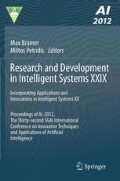Abstract
Classical query answering either assumes the existence of just one knowledge requester, or knowledge requests from distinct parties are treated independently. Yet, this assumption is inappropriate in practical applications where requesters are in direct competition for knowledge. We provide a formal model for such scenarios by proposing the Multi-Agent Knowledge Allocation (MAKA) setting which combines the fields of query answering in information systems and multi-agent resource allocation.We define a bidding language based on exclusivityannotated conjunctive queries and succinctly translate the allocation problem into a graph structure which allows for employing network-flow-based constraint solving techniques for optimal allocation.
Access this chapter
Tax calculation will be finalised at checkout
Purchases are for personal use only
Preview
Unable to display preview. Download preview PDF.
References
S. Abiteboul, R. Hull, and V. Vianu. Foundations of Databases. Addison-Wesley, 1995.
Ravindra K. Ahuja, Thomas L. Magnanti, and James B. Orlin. Network Flows: Theory, Algorithms, and Applications. Prentice Hall, 1993.
C. Boutilier and H. Hoos. Bidding languages for combinatorial auctions. In Proc. IJCAI’01, pages 1211–1217, 2001.
S. J. Brams. On envy-free cake division. J. Comb. Theory, Ser. A, 70(1):170–173, 1995.
Dan Brickley and Ramanathan V. Guha, editors. RDF Vocabulary Description Language 1.0: RDF Schema. W3C Recommendation, 2004.
A. Cal`ı, G. Gottlob, and M. Kifer. Taming the infinite chase: Query answering under expressive relational constraints. In Proc. KR’08, pages 70–80, 2008.
D. Calvanese, G. De Giacomo, D. Lembo, M. Lenzerini, and R. Rosati. Tractable reasoning and efficient query answering in description logics: The dl-lite family. J. Autom. Reasoning, 39(3):385–429, 2007.
A. K. Chandra and P. M. Merlin. Optimal implementation of conjunctive queries in relational data bases. In Proc. STOC’77, pages 77–90, 1977.
P. Cramton, Y. Shoham, and R. Steinberg. Combinatorial Auctions. MIT Press, 2006.
M. Croitoru and S. Rudolph. Exclusivity-based allocation of knowledge. In Proc. AAMAS 2012, pages 1249–1250, 2012.
A. Giovannucci, J. Rodriguez-Aguilar, J. Cerquides, and U. Endriss. Winner determination for mixed multi-unit combinatorial auctions via Petri nets. In Proc. AAMAS’07, 2007.
N. Nisan. Bidding and allocations in combinatorial auctions. In Proc. EC-2000, 2000.
D. Porello and U. Endriss. Modelling combinatorial auctions in linear logic. In Proc. KR’10,2010.
Eric Prud’hommeaux and Andy Seaborne, editors. SPARQL Query Language for RDF. W3C Recommendation, 2008.
M. Rothkopf, A. Pekec, and R. Harstad. Computationally manageable combinational auctions. Management Science, 44:1131–1147, 1998.
W3C OWL Working Group. OWL 2 Web Ontology Language Recommendation, 2009.: Document Overview. W3C
Author information
Authors and Affiliations
Corresponding author
Editor information
Editors and Affiliations
Rights and permissions
Copyright information
© 2012 Springer-Verlag London
About this paper
Cite this paper
Rudolph, S., Croitoru, M. (2012). Multi-Agent Knowledge Allocation. In: Bramer, M., Petridis, M. (eds) Research and Development in Intelligent Systems XXIX. SGAI 2012. Springer, London. https://doi.org/10.1007/978-1-4471-4739-8_12
Download citation
DOI: https://doi.org/10.1007/978-1-4471-4739-8_12
Published:
Publisher Name: Springer, London
Print ISBN: 978-1-4471-4738-1
Online ISBN: 978-1-4471-4739-8
eBook Packages: Computer ScienceComputer Science (R0)

